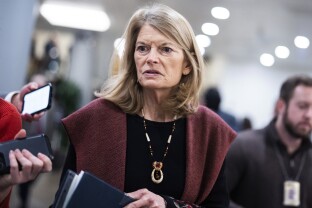Tribal nations are struggling to cover the costs of heating, food and education because of the government shutdown, advocates said at a Senate Indian Affairs Committee hearing Wednesday.
The tribal representatives said the effects of the shutdown were already visible in their communities, where federal programs, grants and government staff are essential for everything from running school districts to community banks to heating assistance. At the top of mind for the advocates were the funding lapses programs like the Supplemental Nutrition Assistance Program, WIC and Head Start are facing.
“We already face long-standing and continuing challenges with providing access to healthy and nutritious food for our citizens, and the challenges contribute to health and educational and overall wellness disparities across all of our tribal communities,” said Sarah Harris, the vice chair and secretary of the United South and Eastern Tribes.
“The current situation with SNAP and WIC only further exacerbates this situation, and we must further subsidize to provide for the failure of our federal partners to meet their trust and treaty obligations,” Harris went on.
Representatives from tribal groups explained to the Senate Indian Affairs Committee that their communities had been caught up in federal funding freezes, agency restructuring and now the shutdown. They pleaded to be insulated from politics.
Kerry Bird, the president of the National Indian Education Association, said tribal school districts are “burning through reserves” just to be able to pay their teachers as Department of Education grants are stalled and tribal-facing staff have been furloughed or laid off.
Bird said that as of Wednesday, seven of nine staff within the Education Department’s Office of Indian Education had received RIFs.
“That means no one to process grants, approve budgets or support tribal education departments and Indian parent committees,” Bird said. “If these terminations are allowed to go into full effect, Indian education programs as we know them would be functionally eliminated.”
The Department of Education did not immediately respond to a request for comment.
Alaska Sen. Lisa Murkowski, who chairs the Indian Affairs Committee, said she’d seen freezers of subsistence food destroyed by power loss from a devastating typhoon in Alaska earlier this month. That heightened the need for food assistance from the federal government through SNAP and WIC, she said.
“Their food source for the winter is gone. And then the reliance on SNAP, as you have pointed out, in so many of these communities,” Murkowski said. “So this is a point that for many in Alaska is tangibly real and tangibly frightening. And so everything that we can do to make sure that SNAP and WIC funding is able to proceed, I think has got to be a priority for us.”
Murkowski earlier this week told reporters that she sees the funding drop-off programs like SNAP are facing on Nov. 1 as a “pivot point” for shutdown negotiations.
The advocates at the hearing reiterated that urgency.
“I cannot highlight enough how food security is critical for us right now,” said Ben Mallott, the president of the Alaska Federation of Natives. “As SNAP is about to end on Friday, we are looking at the ability for our communities to decide between heating and fuel.”
Sen. Brian Schatz, the Indian Affairs Committee’s vice chair, pointed out that the problems voiced by the witnesses could continue even after the shutdown due to the Trump administration laying off tribal-serving staff and freezing grants.
“You need to know: If this thing is over at some point next month, are your problems over or are you still suffering through 30% of it? Ninety percent of it? Two percent of it?” Schatz said. “And the fact that we don’t know the answer to that, that we don’t know and you don’t know, I think is a problem.”
—
This story was produced as part of a partnership between NOTUS and The Salt Lake Tribune.
Sign in
Log into your free account with your email. Don’t have one?
Check your email for a one-time code.
We sent a 4-digit code to . Enter the pin to confirm your account.
New code will be available in 1:00
Let’s try this again.
We encountered an error with the passcode sent to . Please reenter your email.


